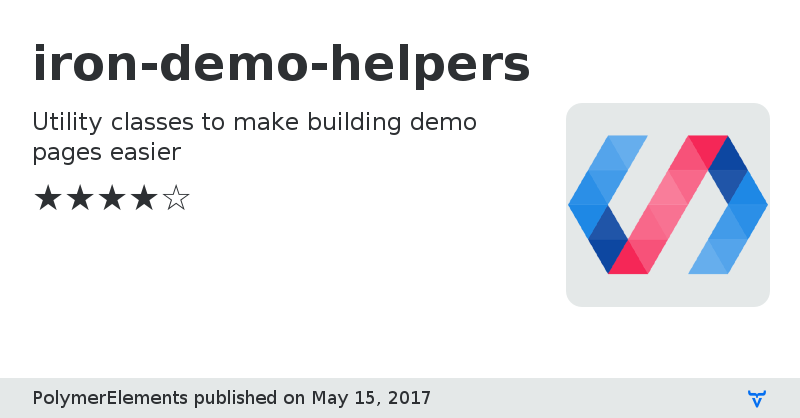iron-demo-helpers - Vaadin Add-on Directory
Utility classes to make building demo pages easier
View on GitHub
Issue tracker
Online Demo
License
View on NPM
iron-demo-helpers version 1.0.0
### Dependencies
* polymer#Polymer/polymer#^1.1.0
* paper-styles#PolymerElements/paper-styles#^1.0.0
iron-demo-helpers version 1.0.1
### Dependencies
* polymer#Polymer/polymer#^1.1.0
* paper-styles#PolymerElements/paper-styles#^1.0.0
iron-demo-helpers version 1.0.2
### Dependencies
* polymer#Polymer/polymer#^1.1.0
* paper-styles#PolymerElements/paper-styles#^1.0.0
iron-demo-helpers version 1.0.3
### Dependencies
* polymer#Polymer/polymer#^1.1.0
* paper-styles#PolymerElements/paper-styles#^1.0.0
* marked-element#polymerelements/marked-element#^1.0.0
* prism-element#PolymerElements/prism-element#^1.0.0
iron-demo-helpers version 0.0.1
### Dependencies
* @polymer/polymer#^1.2.5-npm-test.2
* @polymer/paper-styles#^0.0.1
* @polymer/marked-element#^0.0.1
* @polymer/prism-element#^0.0.1
iron-demo-helpers version 0.0.3
### Dependencies
* @polymer/polymer#^1.2.5-npm-test.2
* @polymer/paper-styles#^0.0.3
* @polymer/marked-element#^0.0.3
* @polymer/prism-element#^0.0.3
iron-demo-helpers version 1.1.0
### Dependencies
* polymer#Polymer/polymer#^1.1.0
* iron-icons#PolymerElements/iron-icons#^1.0.0
* paper-icon-button#PolymerElements/paper-icon-button#^1.0.0
* paper-styles#PolymerElements/paper-styles#^1.0.0
* marked-element#polymerelements/marked-element#^1.0.0
* prism-element#PolymerElements/prism-element#^1.0.0
iron-demo-helpers version 1.1.1
### Dependencies
* polymer#Polymer/polymer#^1.1.0
* iron-icons#PolymerElements/iron-icons#^1.0.0
* paper-icon-button#PolymerElements/paper-icon-button#^1.0.0
* paper-styles#PolymerElements/paper-styles#^1.0.0
* marked-element#polymerelements/marked-element#^1.0.0
* prism-element#PolymerElements/prism-element#^1.0.0
iron-demo-helpers version 1.2.0
### Dependencies
* polymer#Polymer/polymer#^1.1.0
* iron-icons#PolymerElements/iron-icons#^1.0.0
* paper-icon-button#PolymerElements/paper-icon-button#^1.0.0
* paper-styles#PolymerElements/paper-styles#^1.0.0
* marked-element#polymerelements/marked-element#^1.0.0
* prism-element#PolymerElements/prism-element#^1.0.0
* iron-location#PolymerElements/iron-location#^0.8.0
iron-demo-helpers version 1.2.1
### Dependencies
* polymer#Polymer/polymer#^1.1.0
* iron-icons#PolymerElements/iron-icons#^1.0.0
* paper-icon-button#PolymerElements/paper-icon-button#^1.0.0
* paper-styles#PolymerElements/paper-styles#^1.0.0
* marked-element#polymerelements/marked-element#^1.0.0
* prism-element#PolymerElements/prism-element#^1.0.0
* iron-location#PolymerElements/iron-location#^0.8.0
* iron-flex-layout#PolymerElements/iron-flex-layout#^1.3.1
iron-demo-helpers version 1.2.2
### Dependencies
* polymer#Polymer/polymer#^1.1.0
* iron-icons#PolymerElements/iron-icons#^1.0.0
* paper-icon-button#PolymerElements/paper-icon-button#^1.0.0
* paper-styles#PolymerElements/paper-styles#^1.0.0
* marked-element#polymerelements/marked-element#^1.0.0
* prism-element#PolymerElements/prism-element#^1.0.0
* iron-location#PolymerElements/iron-location#^0.8.0
* iron-flex-layout#PolymerElements/iron-flex-layout#^1.3.1
iron-demo-helpers version 1.2.3
### Dependencies
* polymer#Polymer/polymer#^1.1.0
* iron-icons#PolymerElements/iron-icons#^1.0.0
* paper-icon-button#PolymerElements/paper-icon-button#^1.0.0
* paper-styles#PolymerElements/paper-styles#^1.0.0
* marked-element#polymerelements/marked-element#^1.0.0
* prism-element#PolymerElements/prism-element#^1.0.0
* iron-location#PolymerElements/iron-location#^0.8.0
* iron-flex-layout#PolymerElements/iron-flex-layout#^1.0.0
iron-demo-helpers version 1.2.4
### Dependencies
* polymer#Polymer/polymer#^1.5.0
* iron-icons#PolymerElements/iron-icons#^1.0.0
* paper-icon-button#PolymerElements/paper-icon-button#^1.0.0
* paper-styles#PolymerElements/paper-styles#^1.0.0
* marked-element#polymerelements/marked-element#^1.0.0
* prism-element#PolymerElements/prism-element#^1.0.0
* iron-location#PolymerElements/iron-location#^0.8.0
* iron-flex-layout#PolymerElements/iron-flex-layout#^1.0.0
iron-demo-helpers version 1.2.5
### Dependencies
* polymer#Polymer/polymer#^1.5.0
* iron-icons#PolymerElements/iron-icons#^1.0.0
* paper-icon-button#PolymerElements/paper-icon-button#^1.0.0
* paper-styles#PolymerElements/paper-styles#^1.0.0
* marked-element#polymerelements/marked-element#^1.0.0
* prism-element#PolymerElements/prism-element#^1.1.0
* iron-location#PolymerElements/iron-location#^0.8.0
* iron-flex-layout#PolymerElements/iron-flex-layout#^1.0.0
iron-demo-helpers version 1.2.6
### Dependencies
* polymer#Polymer/polymer#^1.5.0
* iron-icons#PolymerElements/iron-icons#^1.0.0
* paper-icon-button#PolymerElements/paper-icon-button#^1.0.0
* paper-styles#PolymerElements/paper-styles#^1.0.0
* marked-element#polymerelements/marked-element#^1.0.0
* prism-element#PolymerElements/prism-element#^1.1.0
* iron-location#PolymerElements/iron-location#^0.8.0
* iron-flex-layout#PolymerElements/iron-flex-layout#^1.0.0
iron-demo-helpers version 2.0.0
### Dependencies
* polymer#Polymer/polymer#1.9 - 2
* font-roboto#PolymerElements/font-roboto#^1
* iron-flex-layout#polymerelements/iron-flex-layout#1 - 2
* iron-location#PolymerElements/iron-location#1 - 2
* marked-element#polymerelements/marked-element#1 - 2
* prism-element#PolymerElements/prism-element#1 - 2
iron-demo-helpers version 3.0.0-pre.1
### Dependencies
* @polymer/polymer#^3.0.0-pre.1
* @polymer/font-roboto#^3.0.0-pre.1
* @polymer/iron-flex-layout#^3.0.0-pre.1
* @polymer/iron-location#^3.0.0-pre.1
* @polymer/marked-element#^3.0.0-pre.1
* @polymer/prism-element#^3.0.0-pre.1
iron-demo-helpers version 3.0.0-pre.2
### Dependencies
* @polymer/polymer#^3.0.0-pre.1
* @polymer/font-roboto#^3.0.0-pre.1
* @polymer/iron-flex-layout#^3.0.0-pre.1
* @polymer/iron-location#^3.0.0-pre.1
* @polymer/marked-element#^3.0.0-pre.1
* @polymer/prism-element#^3.0.0-pre.1
iron-demo-helpers version 3.0.0-pre.3
### Dependencies
* @polymer/polymer#^3.0.0-pre.3
* @polymer/font-roboto#^3.0.0-pre.3
* @polymer/iron-flex-layout#^3.0.0-pre.3
* @polymer/iron-location#^3.0.0-pre.3
* @polymer/marked-element#^3.0.0-pre.3
* @polymer/prism-element#^3.0.0-pre.3
iron-demo-helpers version 3.0.0-pre.4
### Dependencies
* @polymer/polymer#^3.0.0-pre.4
* @polymer/font-roboto#^3.0.0-pre.4
* @polymer/iron-flex-layout#^3.0.0-pre.4
* @polymer/iron-location#^3.0.0-pre.4
* @polymer/marked-element#^3.0.0-pre.4
* @polymer/prism-element#^3.0.0-pre.4
iron-demo-helpers version 3.0.0-pre.6
### Dependencies
* @polymer/polymer#^3.0.0-pre.6
* @polymer/font-roboto#^3.0.0-pre.6
* @polymer/iron-flex-layout#^3.0.0-pre.6
* @polymer/iron-location#^3.0.0-pre.6
* @polymer/marked-element#^3.0.0-pre.6
* @polymer/prism-element#^3.0.0-pre.6
iron-demo-helpers version 3.0.0-pre.7
### Dependencies
* @polymer/polymer#^3.0.0-pre.7
* @polymer/font-roboto#^3.0.0-pre.7
* @polymer/iron-flex-layout#^3.0.0-pre.7
* @polymer/iron-location#^3.0.0-pre.7
* @polymer/marked-element#^3.0.0-pre.7
* @polymer/prism-element#^3.0.0-pre.7
iron-demo-helpers version 3.0.0-pre.8
### Dependencies
* @polymer/polymer#^3.0.0-pre.7
* @polymer/font-roboto#^3.0.0-pre.7
* @polymer/iron-flex-layout#^3.0.0-pre.7
* @polymer/iron-location#^3.0.0-pre.7
* @polymer/marked-element#^3.0.0-pre.7
* @polymer/prism-element#^3.0.0-pre.7
iron-demo-helpers version 3.0.0-pre.10
### Dependencies
* @polymer/polymer#^3.0.0-pre.10
* @polymer/font-roboto#^3.0.0-pre.10
* @polymer/iron-flex-layout#^3.0.0-pre.10
* @polymer/iron-location#^3.0.0-pre.10
* @polymer/marked-element#^3.0.0-pre.10
* @polymer/prism-element#^3.0.0-pre.10
iron-demo-helpers version 3.0.0-pre.11
### Dependencies
* @polymer/polymer#^3.0.0-pre.10
* @polymer/font-roboto#^3.0.0-pre.10
* @polymer/iron-flex-layout#^3.0.0-pre.10
* @polymer/iron-location#^3.0.0-pre.10
* @polymer/marked-element#^3.0.0-pre.10
* @polymer/prism-element#^3.0.0-pre.10
iron-demo-helpers version 2.1.0
### Dependencies
* polymer#Polymer/polymer#1.9 - 2
* font-roboto#PolymerElements/font-roboto#^1
* iron-flex-layout#PolymerElements/iron-flex-layout#1 - 2
* iron-location#PolymerElements/iron-location#1 - 2
* marked-element#PolymerElements/marked-element#1 - 2
* prism-element#PolymerElements/prism-element#1 - 2
iron-demo-helpers version 3.0.0-pre.12
### Dependencies
* @polymer/polymer#3.0.0-pre.12
* @polymer/font-roboto#3.0.0-pre.12
* @polymer/iron-flex-layout#3.0.0-pre.12
* @polymer/iron-location#3.0.0-pre.12
* @polymer/marked-element#3.0.0-pre.12
* @polymer/prism-element#3.0.0-pre.12
iron-demo-helpers version 3.0.0-pre.13
### Dependencies
* @polymer/polymer#^3.0.0-pre.13
* @polymer/font-roboto#^3.0.0-pre.13
* @polymer/iron-flex-layout#^3.0.0-pre.13
* @polymer/iron-location#^3.0.0-pre.13
* @polymer/marked-element#^3.0.0-pre.13
* @polymer/prism-element#^3.0.0-pre.13
iron-demo-helpers version 2.1.1
### Dependencies
* polymer#Polymer/polymer#1.9 - 2
* font-roboto#PolymerElements/font-roboto#^1
* iron-flex-layout#PolymerElements/iron-flex-layout#1 - 2
* iron-location#PolymerElements/iron-location#1 - 2
* marked-element#PolymerElements/marked-element#1 - 2
* prism-element#PolymerElements/prism-element#1 - 2
iron-demo-helpers version 3.0.0-pre.14
### Dependencies
* @polymer/polymer#^3.0.0-pre.13
* @polymer/font-roboto#^3.0.0-pre.14
* @polymer/iron-flex-layout#^3.0.0-pre.14
* @polymer/iron-location#^3.0.0-pre.14
* @polymer/marked-element#^3.0.0-pre.14
* @polymer/prism-element#^3.0.0-pre.14
iron-demo-helpers version 3.0.0-pre.15
### Dependencies
* @polymer/polymer#^3.0.0-pre.13
* @polymer/font-roboto#^3.0.0-pre.15
* @polymer/iron-flex-layout#^3.0.0-pre.15
* @polymer/iron-location#^3.0.0-pre.15
* @polymer/marked-element#^3.0.0-pre.15
* @polymer/prism-element#^3.0.0-pre.15
iron-demo-helpers version 3.0.0-pre.16
### Dependencies
* @polymer/polymer#^3.0.0-pre.13
* @polymer/font-roboto#^3.0.0-pre.16
* @polymer/iron-flex-layout#^3.0.0-pre.16
* @polymer/iron-location#^3.0.0-pre.16
* @polymer/marked-element#^3.0.0-pre.16
* @polymer/prism-element#^3.0.0-pre.16
iron-demo-helpers version 3.0.0-pre.17
### Dependencies
* @polymer/polymer#^3.0.0-pre.13
* @polymer/font-roboto#^3.0.0-pre.17
* @polymer/iron-flex-layout#^3.0.0-pre.17
* @polymer/iron-location#^3.0.0-pre.17
* @polymer/marked-element#^3.0.0-pre.17
* @polymer/prism-element#^3.0.0-pre.17
iron-demo-helpers version 3.0.0-pre.18
### Dependencies
* @polymer/polymer#^3.0.0
* @polymer/font-roboto#^3.0.0-pre.18
* @polymer/iron-flex-layout#^3.0.0-pre.18
* @polymer/iron-location#^3.0.0-pre.18
* @polymer/marked-element#^3.0.0-pre.18
* @polymer/prism-element#^3.0.0-pre.18
iron-demo-helpers version 3.0.0-pre.19
### Dependencies
* @polymer/polymer#^3.0.0
* @polymer/font-roboto#^3.0.0-pre.19
* @polymer/iron-flex-layout#^3.0.0-pre.19
* @polymer/iron-location#^3.0.0-pre.19
* @polymer/marked-element#^3.0.0-pre.19
* @polymer/prism-element#^3.0.0-pre.19
iron-demo-helpers version 2.1.2
### Dependencies
* polymer#Polymer/polymer#1.9 - 2
* font-roboto#PolymerElements/font-roboto#^1
* iron-flex-layout#PolymerElements/iron-flex-layout#1 - 2
* iron-location#PolymerElements/iron-location#1 - 2
* marked-element#PolymerElements/marked-element#1 - 2
* prism-element#PolymerElements/prism-element#1 - 2
iron-demo-helpers version 3.0.0-pre.20
### Dependencies
* @polymer/polymer#^3.0.0
* @polymer/font-roboto#^3.0.0-pre.20
* @polymer/iron-flex-layout#^3.0.0-pre.20
* @polymer/iron-location#^3.0.0-pre.20
* @polymer/marked-element#^3.0.0-pre.20
* @polymer/prism-element#^3.0.0-pre.20
iron-demo-helpers version 3.0.0-pre.21
### Dependencies
* @polymer/polymer#^3.0.0
* @polymer/font-roboto#^3.0.0-pre.21
* @polymer/iron-flex-layout#^3.0.0-pre.21
* @polymer/iron-location#^3.0.0-pre.21
* @polymer/marked-element#^3.0.0-pre.21
* @polymer/prism-element#^3.0.0-pre.21
iron-demo-helpers version 3.0.0-pre.22
### Dependencies
* @polymer/polymer#^3.0.0
* @polymer/font-roboto#^3.0.0-pre.20
* @polymer/iron-flex-layout#^3.0.0-pre.20
* @polymer/iron-location#^3.0.0-pre.20
* @polymer/marked-element#^3.0.0-pre.20
* @polymer/prism-element#^3.0.0-pre.20
iron-demo-helpers version 3.0.0-pre.23
### Dependencies
* @polymer/polymer#^3.0.0
* @polymer/font-roboto#^3.0.0-pre.22
* @polymer/iron-flex-layout#^3.0.0-pre.22
* @polymer/iron-location#^3.0.0-pre.22
* @polymer/marked-element#^3.0.0-pre.22
* @polymer/prism-element#^3.0.0-pre.22
iron-demo-helpers version 3.0.0-pre.24
### Dependencies
* @polymer/polymer#^3.0.0
* @polymer/font-roboto#^3.0.0-pre.22
* @polymer/iron-flex-layout#^3.0.0-pre.22
* @polymer/iron-location#^3.0.0-pre.22
* @polymer/marked-element#^3.0.0-pre.22
* @polymer/prism-element#^3.0.0-pre.22
iron-demo-helpers version 3.0.0-pre.25
### Dependencies
* @polymer/polymer#^3.0.0
* @polymer/font-roboto#^3.0.0-pre.24
* @polymer/iron-flex-layout#^3.0.0-pre.24
* @polymer/iron-location#^3.0.0-pre.24
* @polymer/marked-element#^3.0.0-pre.24
* @polymer/prism-element#^3.0.0-pre.24
iron-demo-helpers version 3.0.0
### Dependencies
* @polymer/polymer#^3.0.0
* @polymer/font-roboto#^3.0.0-pre.25
* @polymer/iron-flex-layout#^3.0.0-pre.25
* @polymer/iron-location#^3.0.0-pre.25
* @polymer/marked-element#^3.0.0-pre.25
* @polymer/prism-element#^3.0.0-pre.25
iron-demo-helpers version 3.0.1
### Dependencies
* @polymer/polymer#^3.0.0
* @polymer/font-roboto#^3.0.0-pre.25
* @polymer/iron-flex-layout#^3.0.0-pre.25
* @polymer/iron-location#^3.0.0-pre.25
* @polymer/marked-element#^3.0.0-pre.25
* @polymer/prism-element#^3.0.0-pre.25
iron-demo-helpers version 3.0.2
### Dependencies
* @polymer/polymer#^3.0.0
* @polymer/font-roboto#^3.0.0-pre.25
* @polymer/iron-flex-layout#^3.0.0-pre.25
* @polymer/iron-location#^3.0.0-pre.25
* @polymer/marked-element#^3.0.0-pre.25
* @polymer/prism-element#^3.0.0-pre.25
iron-demo-helpers version 3.1.0
### Dependencies
* @polymer/polymer#^3.0.0
* @polymer/font-roboto#^3.0.0-pre.25
* @polymer/iron-flex-layout#^3.0.0-pre.25
* @polymer/iron-location#^3.0.0-pre.25
* @polymer/marked-element#^3.0.0-pre.25
* @polymer/prism-element#^3.0.0-pre.25